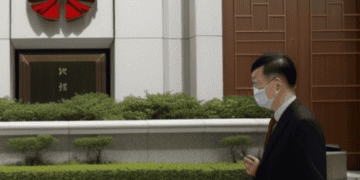The People’s Bank of China, the nation’s central bank, has recently made a strategic adjustment to its monetary policy in response to the economic challenges faced during the post-pandemic recovery phase. This adjustment involves a reduction in the one-year loan prime rate (LPR), a critical benchmark for corporate borrowing, from 3.55 percent to 3.45 percent. Meanwhile, the five-year LPR, which influences mortgage rates, remains unchanged at 4.2 percent.
China, holding the status of the world’s second-largest economy, has encountered several hurdles in its journey to economic recovery following the COVID-19 pandemic. Among these challenges are a decline in global demand for Chinese goods, attributed to the current uncertain state of the global economy. Domestic issues, including a downturn in the property market and a historic low in birth rates, have also contributed to the economic headwinds.
Concerns have been heightened in the financial sector due to fears of potential defaults by major real estate firms. Notably, the financial health of Country Garden has been under scrutiny, following the default of another significant property developer, Evergrande, on more than $300 billion of debt in 2021.
In a related development, the Chinese government has decided to cease the publication of detailed youth unemployment statistics. This follows the reporting of a 21.3 percent unemployment rate among young people in June.
The central bank’s decision to reduce the one-year LPR has elicited varied responses from market analysts. Some analysts expected more robust measures to stimulate economic growth and viewed the rate cut as a conservative move. Following the announcement, a slight downturn was observed in the stock markets, with Hong Kong shares falling by 1.4 percent and the Shanghai stock market declining by 0.6 percent.
Experts like Masayuki Kichikawa of Sumitomo Mitsui DS Asset Management and Maggie Wei of Goldman Sachs have offered their perspectives on the implications of this policy change. Kichikawa highlighted concerns about the potential impact on the yuan’s value, while Wei pointed out the possible limitations of the rate cut in fostering economic confidence.
In response to external commentary on China’s economic future, officials from the Ministry of Foreign Affairs have expressed optimism about the country’s growth trajectory and resilience in overcoming current challenges.
Discover comprehensive supply chain report news insights at The Supply Chain Report. For international trade resources, visit ADAMftd.com.
#PeoplesBankofChina #ChinaMonetaryPolicy #LoanPrimeRate #LPR #EconomicRecovery #ChinaEconomy #PostPandemicRecovery #GlobalDemand #ChinaPropertyMarket #YouthUnemployment #CountryGarden #EvergrandeDefault #RealEstateDebt #StockMarketDecline #HongKongShares #ShanghaiStockMarket #SumitomoMitsui #GoldmanSachs #EconomicGrowth #YuanValue #ChinaGrowthTrajectory #ChinaMinistryOfForeignAffairs #ChinaResilience
















